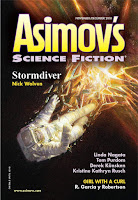
★★★★☆ A fine ride with good companions
(Fantasy Adventure) A gifted young man is obsessed with flying machines, not least because they’re outlawed. (7,247 words; Time: 24m)
"Theories of Flight," by Linda Nagata [bio] (edited by Sheila Williams), appeared in Asimov's Science Fiction issue 11-12|18, published on October 18, 2018 by Penny Publications.
Mini-Review (click to view--possible spoilers)
Review: 2018.586 (A Word for Authors)
Pro: The world has a lot of complexity to it. People remember their past lives. There’s a goddess who might be real. People are called “players” for some reason (making me think they all live in a video game), and, of course, there’s the mysterious, lethal, silver. Ultimately, I concluded this is a fantasy story in a secondary world that has 20th-century-level technology.
Yaphet charms us with his innocent scientific curiosity. It’s hard to believe he so easily makes a flying machine until he remarks that he’s sure he has done it before. He’s a good person, as his determination to use the machine to help his cousin shows.
The story ends at a natural point; it’s all about Yaphet learning to fly, and not only has he done so, he’s leaving home too.
Con: This feels a lot like a fragment of a longer story. F&SF says the author’s novel Memory was the "inspiration," but it’s hard to know what that means.
Other Reviews: Search Web, Browse Review Sites (Issue 11-12|18)
Linda Nagata Info: Interviews, Websites, ISFDB, FreeSFOnline
Follow RSR on Twitter, Facebook, RSS, or E-mail.
Pro: The world has a lot of complexity to it. People remember their past lives. There’s a goddess who might be real. People are called “players” for some reason (making me think they all live in a video game), and, of course, there’s the mysterious, lethal, silver. Ultimately, I concluded this is a fantasy story in a secondary world that has 20th-century-level technology.
Yaphet charms us with his innocent scientific curiosity. It’s hard to believe he so easily makes a flying machine until he remarks that he’s sure he has done it before. He’s a good person, as his determination to use the machine to help his cousin shows.
The story ends at a natural point; it’s all about Yaphet learning to fly, and not only has he done so, he’s leaving home too.
Con: This feels a lot like a fragment of a longer story. F&SF says the author’s novel Memory was the "inspiration," but it’s hard to know what that means.
Other Reviews: Search Web, Browse Review Sites (Issue 11-12|18)
Linda Nagata Info: Interviews, Websites, ISFDB, FreeSFOnline
Follow RSR on Twitter, Facebook, RSS, or E-mail.
No comments (may contain spoilers):
Post a Comment (comment policy)